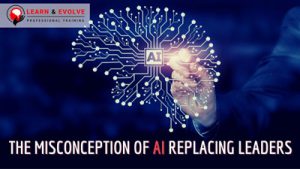 Throughout the years, Hollywood has made us fear the idea of AI taking over our world, hence our jobs. This argument is not highly unrealistic since we can already observe an apparent eradication of some occupations. Yet, what most people fail to realize is that, while a good amount of old-fashioned jobs have decreased, AI has brought up many new opportunities and educational prospects that were not available before its existence. There are numerous different skills that AI is incapable of replicating, allowing a lot of other jobs to only be filled by people, like leadership positions. It is essential to make yourself aware of these various skills to expand your knowledge, utilize technology in the best way possible and maintain your career.
Throughout the years, Hollywood has made us fear the idea of AI taking over our world, hence our jobs. This argument is not highly unrealistic since we can already observe an apparent eradication of some occupations. Yet, what most people fail to realize is that, while a good amount of old-fashioned jobs have decreased, AI has brought up many new opportunities and educational prospects that were not available before its existence. There are numerous different skills that AI is incapable of replicating, allowing a lot of other jobs to only be filled by people, like leadership positions. It is essential to make yourself aware of these various skills to expand your knowledge, utilize technology in the best way possible and maintain your career.
Emotions, Perception, and Communication
Being the only ones in the animal kingdom who can communicate using words, perceive things in different ways and feel each other’s emotions, people top AI in this domain. Employees turn to their leaders for empathy, care, and educational conversations when needed. Because AI does not own any experiences, wisdom can only be shared from person to person. In addition to that, only a leader can put themselves in their employees’ shoes to fully comprehend a situation.
Creativity
People are innately intuitive and tend to use this when creating new concepts. While it is evident that AI can create different types of things, these are usually a combination of already existing concepts and algorithms that are tested to perform well but are not very original. This creativity skill is only available in humans who take on various risky steps when coming up with something completely original. AI cannot be taught intuition, which renders it capable of creating anything but logical. Leaders use their creativity to develop solutions for various problems that AI would be incapable of fixing in the simplest and best ways possible.
Human Touch
While AI could respond to simple ‘yes or no’ questions, most people prefer discussing their issues with an actual person. A leader could only resolve the multifaceted problems that individuals could be suffering from in a company since AI would not be a program for such complex ideas. Regardless of that, even if AI becomes capable of adding an artificial type of human touch to its responses, employees will always carry the need of having a conversation with a person.
Given all these mentioned leadership skills that AI cannot replicate, it is essential to note the advantages and benefits of technology to simplify its leader’s tasks.
Setting Goals
A leader’s main task is to set a company’s goals to better its chances of success. This could be a little aggravating for some people since it is not always easy to predict all of the pertinent financial and time-related aspects for a suitable plan. AI aids a leader by narrowing down the company’s best achievable goals, leaving the person’s final decision.
Analyzing End Results
Since the analysis constantly overworks leaders, they have to prepare to make sure that everything is working perfectly; AI simplifies these tasks by analyzing all of the issues that the company might be going through and prioritizing the ones that need to be solved first.
Simplifying Mundane Tasks
There are numerous routine tasks that a leader must constantly complete before they could have some time to look at more significant issues. To reduce time, AI completes these mundane tasks, allowing a leader to focus on its growth and success.
While technology expands tremendously every year, its benefits become more and more apparent. While AI could never replace a company’s leaders, they need to understand its benefits and utilize it correctly to maximize its advantages. Leaders should not fear the work AI can copy but focus on the work it can better.





